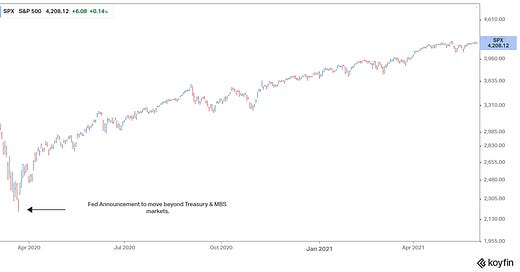The Fed informed us yesterday afternoon that it will begin selling its portfolio of corporate bonds.
Let's talk about what that means…
Back in March of last year, the Fed's response to the pandemic started with some massive action on a Sunday night, where they slashed rates to zero and started a big bond buying program (Treasuries and Mortgages).
They didn't address the troubled corporate bond market, and that threat was rattling markets and the economy. Stocks were continuing to plunge, and the Fed was losing control of the Treasury market.
A week later, they backstopped the corporate bond market.
They made the announcement on March 23rd, that they would move beyond the Treasury and MBS market, and start buying corporate bonds, namely bond ETFs. That was the relief valve for the markets, which was a big deal, and the message from this action was maybe even more significant. It was the explicit signal to markets that they will do "whatever it takes" and they will backstop everything, if they have to.
So, with the addition of bond ETFs, the Fed had crossed the Rubicon - they were now explicitly in the stock market. Stocks bottomed that day...
For the reasons described above, any dip in stocks, thereafter, was a buy. Why? The Fed had told us they would do whatever it takes, and losing the stock market would have been an undoing of all of the rescue and emergency policies. If needed, they would have bought stocks...and that threat/promise continues.
Interestingly, as we learned from the European Central Bank's similar tactic in 2012, when Mario Draghi vowed to do "whatever it takes" to save the sovereign debt market in Europe, when the central banks make these promises, they don't have to deliver on them. Just the threat of their presence in a market is enough to get lenders lending again, buyers buying again. In this case, within months of the announcement, even crippled airline companies were able to issue billions of dollars of bonds. All told, the Fed only had to buy $13.8 billion worth of corporate bonds - a tiny fraction of the total market.
What's the takeaway from this move today? It symbolises the first move in unwinding emergency policies (though they say it doesn't).




